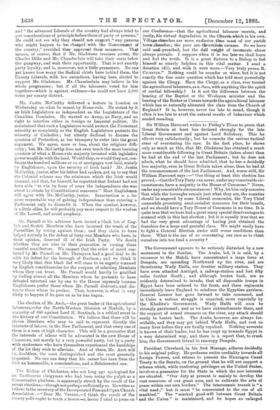The Bishop of Chichester, who not long ago apologised for
an Eastbourne clergyman who had been using the pulpit as a Conservative platform, is apparently struck by the result of the recent elections,—though not perhaps sufficiently so. Hawrites as follows to the secretary of the Incorporated Freeand Open. Church Association :—" Dear Mr. Vernon,—I think the result of the county polls ought to teach a lesson—a lesson I tried to press on
our Conference—that the agricultural labourer resents, and justly, his virtual degradation in the Church, which is his own. Village churches are more exclusive than most of our parish town churches ; the poor are,.titrustiato corners. So we have said and, preached, but the dull weight of inveterate abuse always prevails. I suppose when it is too late-we shall learn and feel the truth. It is a great distress to a Bishop to feel himself so utterly helpless in this vital matter. I send a. donation (25), and wish it were more.—Very truly yours, R. CICESTER." Nothing could be sounder or wiser, but it is not exactly the free seats question which has told most powerfully against the Clergy. Have the Clergy, as a class, ever treated the agricultural labourers, as a class, with anything like the spirit of cordial fellowship ? Is it not the difference between the bearing of the Baptist or the Wesleyan minister and the bearing of the Rector or Curate towards the agricultural labourer which has so naturally alienated the class from the Church of England ? It is, however, never too late to mend, though it often is too late to avert the natural results of behaviour which needed mending.


















































 Previous page
Previous page